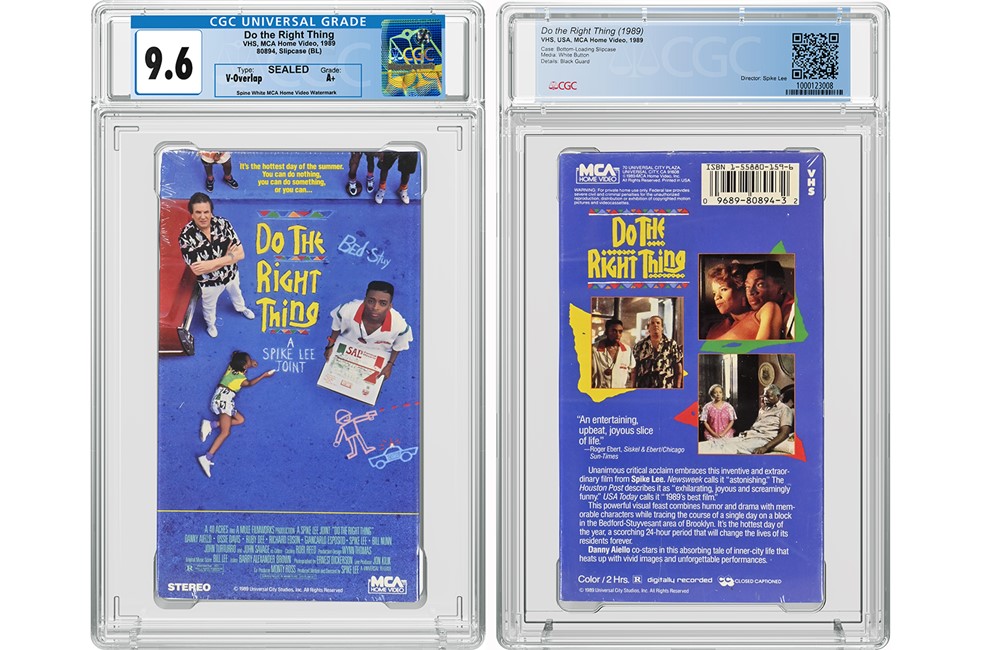
Black History Month — also known as African American History Month — is an annual celebration of the Black community’s history and achievements. The month-long observance serves as a time to reflect on and pay homage to Black Americans who have made noteworthy contributions to the US, such as in scientific industries, politics and even entertainment.
The accomplishments of figures in the Black community have been recorded in various forms of media, including books, journalism and films. Thousands of movies have been released depicting important periods and people in Black history — some fictional and others non-fictional — while others have given Black directors and actors their doorway to stardom and fame.
In observance of Black History Month, CGC Home Video has chosen 10 films that we think are worth watching (and collecting!) during the monthlong tribute. Check out our list below:
A can’t-miss film during Black History Month, Hidden Figures explores the intertwined fates of three African American mathematicians — Katherine Goble Johnson, Dorothy Vaughan and Mary Jackson — and their contributions to NASA and the Space Race. Starring Octavia Spencer, Janelle Monáe and Taraji P. Henson, the film received critical acclaim and praise for its ability to impress the stories of all three women in an unforgettable and inspiring narrative that leaves audiences reflecting on the crucial impact that Black Americans had in such an important moment in US history.
 |
Spike Lee’s Do The Right Thing expertly captures rising racial tensions between an American Italian pizzeria owner and the citizens of the primarily African American neighborhood his business resides in. The 1989 “hood” film is regarded as one of the best films of the era, according to critics and general audiences. Along with receiving Oscar Nominations for Best Original Screenplay and Best Supporting Actor, Do The Right Thing won the award for Best Film from the Los Angeles Film Critics Association in 1990.
The Watermelon Woman was a groundbreaking film for a variety of reasons. The main character, Cheryl, is a Black lesbian who embarks on a mission to uncover the history and identity of “The Watermelon Woman,” a Black actress who played a mammy in a film titled Plantation Memories. The Watermelon Woman is credited as a landmark in New Queer Cinema for its depiction of a Black lesbian and positive LGBT messages and is critically acclaimed for exploring how Black actresses were sidelined or forgotten in film history. It is directed by Cheryl Dunye, who became the first Black lesbian to direct a feature film.
 |
Sidney Poitier is one of the most influential Black actors of all time. He was the first African American to be nominations for the Academy Award for Best Actor, which was a result of his stellar performance in The Defiant Ones. In the film, Poitier portrays Noah Cullen — a Black convict who is chained together with white convict John “Joker” Jackson. The two prisoners escape into the wilderness and must learn to survive and cooperate, since they’re still chained together. Though Poitier did not win the award for The Defiant Ones, it did launch him into stardom, leading to him winning Academy and Golden Globe awards for Lilies of the Field.
You can’t celebrate Black History Month without appreciating Dr. Martin Luther King Jr., and Selma is the perfect film to watch in his honor. Selma recounts Dr. King’s march from Selma, Alabama, to the capital of Montgomery, which ultimately led to President Johnson signing the order to eliminate racial discrimination in voting. The film was directed by Ava Marie DuVernay, the founder of film distributor ARRAY.
Black History Month celebrates the entirety of the Black community, including subgroups. Daughters of the Dust follows a Gullah family as they decide whether to stay in the rural south or migrate North in the face of the slave uprising. The film is praised for its weighty themes, use of traditional Gullah language and portrayal of Gullah culture. In 2004, Daughters of the Dust was selected for preservation in the United States National Film Registry for being culturally, historically and aesthetically significant.
During the American Civil War, Robert Gould Shaw is offered the rank of Colonel and command of the 54th Regiment Massachusetts Volunteer Infantry, one of the first Black regiments in the Union Army. Shaw builds a strong unit and fights to have his regiment placed in the heat of battle, encountering challenges along the way. Glory features several influential Black actors, including Denzel Washington, Morgan Freeman and Andre Keith Braugher.
 |
Lean on Me is a biographical drama about Joe Louis Clark, a high school principal who is placed in charge of Eastside High School in Paterson, New Jersey. The school has deteriorated due to drug use and criminal activity, and unless Clark can help the students improve their test scores, the school will be placed into receivership of the New Jersey state government, leaving hundreds of minority students without an education. Lean on Me stars Morgan Freeman in one of his most notable film roles.
While most film enthusiasts today recognize names such as Morgan Freeman and Sidney Poitier, other Black actors and actresses were responsible for improving and advancing the portrayal and social standing of the Black population in film. One of these early pioneers was Louise Beavers, who appeared in dozens of films and TV shows from the 1920s to 1960.
In Imitation of Life, Beavers portrays Delilah Johnson, a Black housekeeper who mistakenly enters and cleans the home of widow Bea Pullman. Pullman invites Johnson to stay since the two women are both entrepreneurs and their daughters get along. Together, Pullman and Johnson launch a successful pancake restaurant and retail business using Johnson’s recipe. Imitation of Life explores several racial themes, including the success of a Black-owned business in the early 1900s, racial “passing” and conflicting cultures.
Directed by Steve McQueen — a Black film director known for intense subject matter — 12 Years a Slave is a biographical drama about Solomon Northup, a free Black man from New York who is captured and sold into slavery. Northup faces cruelty and struggles to stay alive for 12 years until a chance meeting with a Canadian abolitionist leads to his freedom. The film received critical acclaim across the world and won several Academy Awards, making McQueen the first Black British producer to ever receive the Best Picture award.